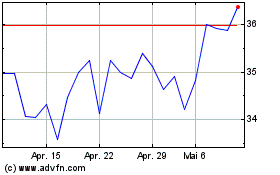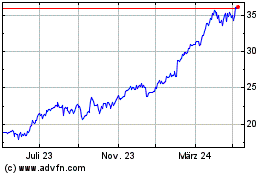After Yearslong Cleanup, Italian Banks Brace for More Bad Loans
06 Mai 2020 - 3:22PM
Dow Jones News
By Giovanni Legorano
ROME -- Italian banks have spent years cleaning up the bad loans
on their books. The coronavirus downturn leaves them with more work
to do.
Italy's lenders came into the crisis as one of the weaker parts
of the European banking landscape, still suffering from some of the
effects of the region's sovereign debt crisis and struggling with
sluggish economic growth and low rates. After two months of
lockdown imposed by the Italian government, uncertainty hangs over
how the induced economic coma and its aftermath will translate into
losses for local banks as the companies they lend to inevitably
default on loan repayments.
Senior management at Italian banks are displaying cautious
confidence about the resilience of their businesses and of the
nation's economy. However clear signs that pain lies ahead were
visible as the country's largest banks reported first-quarter
earnings this week.
"It's clear the first issue Italian banks will face in the next
months will be a rise in bad loans," said Angelo Baglioni, an
economics professor at Milan's Catholic University.
UniCredit SpA, Italy's largest bank by assets, posted a EUR2.71
billion ($2.94 billion) net loss, compared with a net profit of
EUR1.18 billion in the same period last year. The loss was driven
by EUR1.26 billion in provisions for bad loans, up from EUR467
million a year earlier and a number of one-off costs.
The bank, which unveiled a new strategic plan last December,
said it would update that plan at the end of this year or early in
2021, in light of the conditions brought about by the pandemic.
"European economies have only very recently and gradually begun
to reopen. It's too early to quantify the pace and shape of any
recovery," UniCredit's Chief Executive Jean Pierre Mustier said.
"[The pandemic] will have a profound impact on the global economy.
This is true also for UniCredit and its stakeholders."
Next year's net profit will likely be between EUR3 billion to
EUR3.5 billion, or 75% to 80% of what the bank targeted in its last
strategic plan, Mr. Mustier said.
Banking results for the first quarter are offering an initial
test on the effects of the lockdown measures the Italian government
-- and other European governments -- imposed to contain the spread
of the novel coronavirus.
Since March 10, Rome has gradually shut down most nonessential
economic activity to contain the pandemic. It only started
rebooting its economy on Monday, allowing factories, construction
sites and wholesale commerce to reopen.
Much of the consumer economy remains suspended. Most shops can
reopen from May 18. Restaurants, bars and hairdressers will have to
wait until June 1. Economic normalcy could take much longer to
achieve.
Italy's lockdown has been one of the strictest and longest
outside of Asia and the impact on the country's economy will be
huge. The International Monetary Fund predicts that Italy's gross
domestic product will shrink 9.1% in 2020.
The Italian government has so far launched a program of
guarantees for bank loans and liquidity available for businesses
and households of EUR750 billion.
However, while supporting economic recovery, increased lending
and the moratoria on existing loans will further expose Italian
banks to the economic downturn, after years in which they went
through a painful cleanup of their balance sheet and rebuilt
capital buffers.
Many Italian lenders like UniCredit and Intesa Sanpaolo SpA have
been selling nonperforming loan portfolios to investors hungry for
good returns. They account for 7% of total loans, still high by
international standards, but down from 17% in 2015. With such a
significant downturn this year, bad loans are likely to start
piling up again.
After a painful cleanup and strengthening plan carried out in
recent years, UniCredit's plan of share buybacks and dividend
increases to remunerate its shareholders forms part of a four-year
plan that also includes cuts in jobs and costs.
However, it decided to withdraw its dividend payment proposal
for 2019 and to postpone its share-buyback program, following a
request to European lenders by the European Central Bank.
Rival Intesa Sanpaolo also suspended its proposed cash dividend
for 2019 and its entire 2019 net profit allocated to reserves.
On Tuesday, Intesa said it expected to reach a profit of at
least EUR3 billion this year, compared with EUR4.2 billion in
2019.
However, the bank posted a surprise 10% rise in net profit for
the first quarter and said it still plans to pay 75% of its net
profit as dividend this year, if regulators allow it.
Besides booking EUR403 billion in loan-loss provisions, Intesa
said it set aside an additional EUR300 million to cover risks
related to the pandemic and that it could use the proceeds of the
recent sale of its merchant-acquiring business to cover for
additional EUR1.2 billion of pandemic-related losses during the
year, if needed.
Write to Giovanni Legorano at giovanni.legorano@wsj.com
(END) Dow Jones Newswires
May 06, 2020 09:07 ET (13:07 GMT)
Copyright (c) 2020 Dow Jones & Company, Inc.
Unicredit (BIT:UCG)
Historical Stock Chart
Von Mär 2024 bis Apr 2024

Unicredit (BIT:UCG)
Historical Stock Chart
Von Apr 2023 bis Apr 2024
